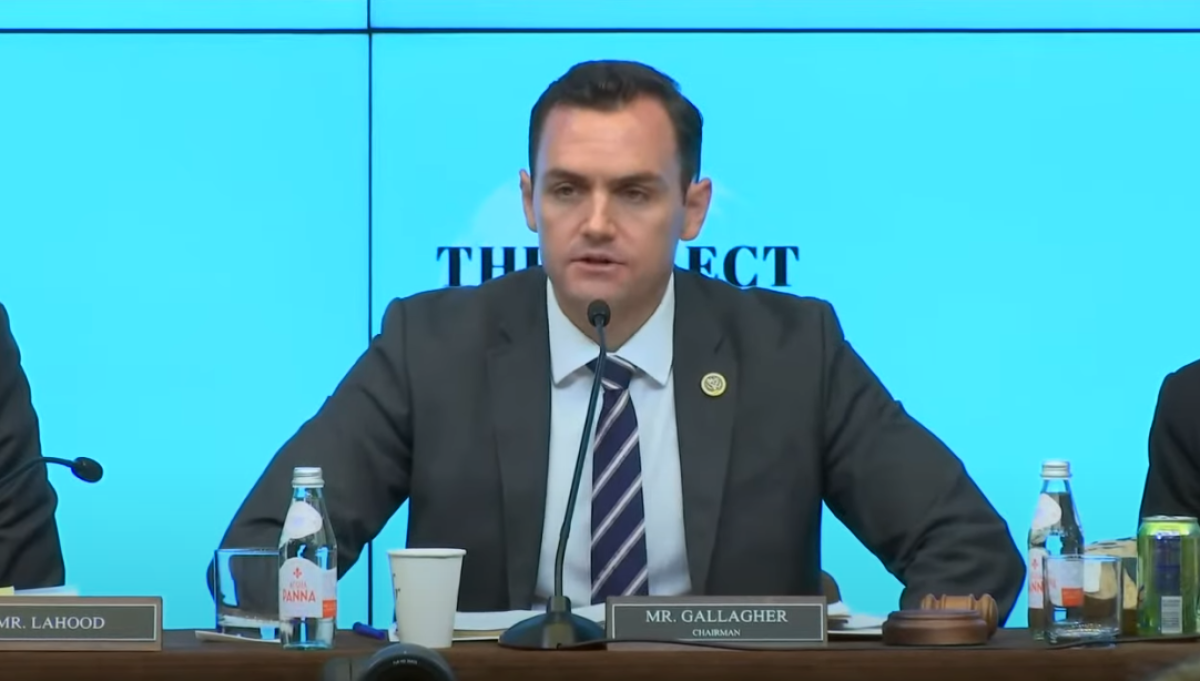Chairman Gallagher's Opening Remarks at the "Systemic Risk: The Chinese Communist Party’s Threat to U.S. Financial Stability" Hearing in New York

Click HERE for full remarks.
-
For years, national security leaders like Admiral Phil Davidson have been screaming from the rooftops that the People’s Republic of China, and specifically the Chinese Communist Party, poses the greatest threat to our nation. President Biden’s Director of National Intelligence, Avril Haines, recently testified that “the CCP represents both the leading and most consequential threat to U.S. national security.” Those closest to the problem, like Admiral Davidson, are the most alarmed.
Yet, here in New York, Wall Street does not act like the PRC is a threat at all. A few months back, the head of a major asset management firm came to my office and told me that the chance of China invading Taiwan in the next five years was, and I quote, “zero.” Another told me that that U.S. would never impose real sanctions on China, even if it were to invade Taiwan. It’s like Washington and Wall Street are two different countries speaking completely different languages.
It's ironic. These banks and asset managers have incredibly complex “value at risk” models to looks at volatility and correlation. But when it comes to the systemic risks emanating from a genocidal communist regime, they put on their golden blindfolds and chase a yield that never comes.
Ranking Member Krishnamoorthi and I recently launched an investigation into Wall Street firms that are funneling American retirement money into companies helping to build aircraft carriers for the PLA Navy, next generation stealth fighter jets for their air force, and artillery shells for the PLA. Mind you, these companies are all blacklisted by the U.S. government and often have strong prohibitions on selling them advanced technology. Yet Wall Street sees no problem shoveling money to them.
Imagine if the disastrous scenario that Admiral Davidson fears is all too plausible comes to pass. China’s military will be raining missiles on our friends in Taiwan, and very likely American servicemembers, with weapons that Americans funded. They may be using AI targeting systems that Silicon Valley VC’s helped them build.
In short, we are financing our own destruction. The Biden administration’s executive order is a first step to address the problem, but it must not be the last. It is up to Congress to ensure American money isn’t financing the CCP’s top tech ambitions, including AI, quantum computing, and semiconductors, but also biotechnologies, directed energy, hypersonics, advanced manufacturing, space technologies, and anything associated with the PRC’s military-industrial complex.
Here's the thing: every day that we keep funding the CCP’s military ambitions, every day that we delay vital military aid to Taiwan, we make conflict in the Indo-Pacific more likely. Last night, we hosted a variety of Wall Street executives at a tabletop exercise that focused not on missiles and torpedoes, but on sanctions, shipping routes, the SWIFT system, supply chains, and other arenas of economic warfare.
We saw that if China were to initiate preparations to invade Taiwan, the losses across our financial system would dwarf the write-downs taken at the outset of the Russia-Ukraine war. The entire U.S. economy and banking system would be imperiled. Equity markets would drop precipitously as global shipping lanes closed, shipping insurance premiums skyrocketed, supply chains broke down, and the specter of global conflict grew. Americans would see their pensions shrink and their bank accounts hemorrhage cash.
What is Wall Street doing to guard against that outcome? Are banks and asset managers moving to protect American investors? Or are they just betting on another bailout?
The risks go well-beyond a kinetic conflict in the Taiwan Strait. American investors in China are like the proverbial frogs slowly boiling in a pot of water. The CCP is criminalizing routine business practices – often ones necessary for fulfilling fiduciary obligations to investors and shareholders like due diligence, data gathering, and independent corporate governance.
Given the myriad risks, you would think that if American pension money were going into Chinese firms, we would have much HIGHER accounting and regulatory standards for those firms, especially when they list on our exchanges. But in fact, the very opposite is true. A recent deal struck between the SEC, PCAOB, and the Chinese government effectively circumvents the Holding Foreign Companies Accountable Act and allows China to audit its own firms — throwing American investors to the wolves and disadvantaging American companies. The CCP has nothing but contempt for our democratic-capitalist system, why should they enjoy the unfettered benefits of our capital markets?
If nothing else, you would think Wall Street would think twice about financing companies that facilitate the CCP’s Uyghur genocide, engage in forced genetic testing of repressed populations, or use forced labor up and down their supply chains. To quote written testimony submitted by David McCormick, the former CEO of Bridgewater Associates, will these firms ever stop “underwriting immoral behavior?”
The truth is American pensions, endowments, and retirement savings are not being protected, they are being swindled. Fraud, fake accounting, and outright lies are endemic to the communist system. Taking on a genocidal, communist regime as a business partner is not a recipe for success. It is a recipe for systemic risk.